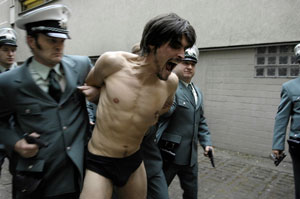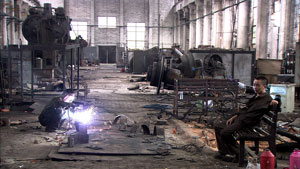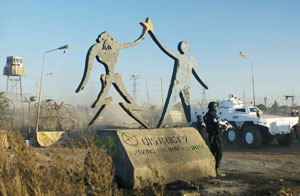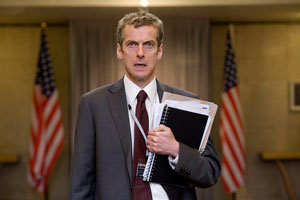THEY'LL GET BETTER AT IT AS THEY GO ALONG: THE BEST FILMS OF 2009
 Friday, January 1, 2010 at 08:18PM
Friday, January 1, 2010 at 08:18PM
Someone gave me a hard time the other day, demanding to know why I don’t write more about movies everyone has seen—and this was another Rail film reviewer! The answer’s obvious, ain’t it? As much as the mainstream can blow, it blew with particular force in 2009. Meanwhile, as every outlet kept telling us, the heyday of indie film is over. Distributors are dying, venues are shuttered, Netflix and cable obviate the need for theatrical release. Yet the best films this year gave the lie to that thesis; all are international, indie or straight-up arthouse. Even District 9, a blockbuster if there ever was one, felt under the radar, subversive somehow, as if no film with such big box office should be so witty and complex. 2009 gave us few masterpieces and almost as few immersive escapes.
This year, we had to search out the gems.

 Beware, beware, beware of the naked man: Baader Meinhoff Complex
Beware, beware, beware of the naked man: Baader Meinhoff Complex
1) Baader Meinhof Complex
How could you top this story? Murderous, brilliant, shockingly effective cast-offs of the German bourgeoisie invent modern urban terrorism, merge European and Middle Eastern guerrilla outfits, take psychic control of an entire nation, make a farce of its judicial system and then die/get murdered in prison. The film walks a moral and dramatic tightrope that perfectly captures the psychosis, ambition, rock star sex appeal, and unintentional, homicidal self-parody of Germany’s foremost terrorists of the Vietnam era. Told with a dynamic camera and absolutely no explanation, Complex, like the best films of 2009, leaves you to draw your own conclusions. The overriding conclusion, as with all the best films, is that you have been shown every side of the argument, with no melodrama to ease your way through the complexities.
2) 24 City (Er shi si cheng ji)
Jia Zhang-ke, the best director in the world, here reverts to the grand tableau-like tracking shots of his 2006 masterpiece, Still Life. As Rail film critic Lu Chen observed, these shots parallel the Chinese tradition of narrative pictorial scrolls, with their infinitely unrolling, slowly revealed visions. In 24 City, Zheng’s barely moving camera celebrates and undermines China’s aggressive modernism and the denial—of freedom, of community, of history, of truth—that accompanies it. Or, in certain cases, fuels it. The most beautiful film of the year, 24 City proves the most purely cinematic. In merging documentary interviews, actors pretending to be documentary subjects, portraits, unstoppable upthrusting cityscapes and clanging factories immolating themselves in an orgy of self-demolition, Zheng gives us—as the actual 24 City gives itself—a new form, a way of seeing that digests, even as it ignores, all the forms that came before.
3) Police, Adjective (Politist, adj.)
Yes, all you whining complainers, by the standards of Transformers or even French Connection, in this policier very little happens. There are no shoot-outs, car chases, or even tracking shots. It’s Romania; no one can afford them. The tension and poetry reside in the understated, telling observation of the clash between duty and conscience in the day-to-day whether at work or in love. Scenes start small and either stay that way or escalate into verbal pyrotechnics that hit harder than any CGI explosion. No one raises their voice, but lives are changed, hearts revived, corruption ensconced. And how many films would dare to base their climax around a dictionary being read aloud? By my count, only this one, ever.
4) District 9 An orgy of self-demolition: 24 City
An orgy of self-demolition: 24 City
Get some!*
But…some of what?
*( http://www.youtube.com/watch?v=S06nIz4scvI)
 There went the neighborhood: District 95) Adventureland/ZombieLand
There went the neighborhood: District 95) Adventureland/ZombieLand
Leading manchild Jessie Eisenberg establishes the brand in two witty, satisfying, not all that dissimilar movies in which amusement parks figure prominently. One offers the bloodsport of late teen romance, the other ditto killing zombies. Eisenberg’s the same guy in both: too smart/sensitive for the room, but capable of a ruthlessness that makes his incisive nebbish routine more than bearable. Both films revel in self-consciously meta-aware dialogue, aware of the character’s own self-consciousness and of each film’s self-conscious determination to warp genre to its own ambitious ends. Both get cute and suffer genre predictability in the third act, but what can you do? On this level of expenditure, it’s a revelation that they get away with as much brainy anarchy as they do. As for Woody Harrelson’s career, clearly he’s in a post self-consciousness, post self-parody space. A space Bill Murray will never occupy, because after inventing it, he long since transcended. Quote of the year: “I know it’s a pretentious affectation, but it relaxes me.”
6) Exodus (Cheut ai kup gei)
Naked frog-men cops beat a crawling man with hammers under a portrait of a young Queen Elizabeth as opera blares. With that introduction, you might expect another surreal Hong Kong male-bonding police procedural. While vesting deeply in the color-saturated, overly designed visuals of Hong Kong bros-before-hos master Johnny To, Exodus explores the driving question of film noir reduced to its most basic component: are women trying to kill men? And if they are, can love forestall the murder(s)? In this Hong Kong, it’s not To’s lingering glances between he-men cops that hold the passion. In this world, men and women actually make an effort to understand each other. That effort comes to naught, but they really do try. Really.
7) Surveillance
Bill Paxton and Julia Ormond play a couple who understand one another perfectly. Federal agents whose love and lust burn undimmed, they elicit great jealousy and furious anger from the rural dimwit coppers who need help with a rash of grisly serial killings. Director Jennifer Lynch nabbed Off Broadway’s and indie’s best actors to give depth to a modern updating of the kind of idea that built Roger Corman’s American International Pictures. In Lynch’s worldview, true love should and does triumph, even when it’s knee-deep in blood. Inexplicably ignored upon release, this nasty little tale’s sophisticated perfomances and fiendish back-story sneak up on you, and seem more nourishing after the movie than during. Another great line sums up serial killers and couples dealing with their own passion: “They’ll get better at it as they go along, or maybe they just don’t give a shit.”
8) The Missing Person
Michael Shannon shows up again, in almost every shot of this neglected indie noir. With his toreup face and thousand-mile stare, he so belongs in neglected indie noirs it makes you fear he’ll never become a big-movie leading man like he deserves. A drunken defeated private eye who channels both Raymond Chandler and Elliott Gould’s fractured remaking of Marlowe (in Altman’s 1973 The Long Goodbye) has to travel on a job. Of course he meets colorful characters (some a bit too damn colorful, as if they didn’t fully understand the phrase “supporting player”), falls inappropriately in love, and ultimately refuses to do what he got paid for. The style, like the story, revels in throwback, and suffers from how poorly its digital imaging conveys the chiaroscuro that noir requires. But Shannon holds it together, and the quiet dignity of his self-degradation might be the performance of the year.
9) In the Loop Yes, I am an obnoxious wanker!: In The Loop
Yes, I am an obnoxious wanker!: In The Loop
A relentless, hilarious exercise in Brit-style, Swiftian political truth, wherein everyone—especially those holding the fate of the free world in their hands—proudly acts precisely as venal and short-sighted as they really are. Although it’s simplified so American audiences can understand it (subtitles might have helped, too) and depicted as farce, the incessant narcissistic rage seems a more accurate portrayal of our governing processes than any documentary.
10) The Escapist
One method of escaping: The Escapist
Brian Cox, as everybody knows by now, was so far and away the better Hannibal Lecter it ain’t even funny. Missing the boat on the bigger film featuring that character seemed to hamstring his career, and he’s spent all his time since playing smaller parts. With his orotund voice and brave embrace of his baggy body and poxy face, Cox carries a heavy load of melancholy. His intensity, and the perfect scaling of his emotion to every moment, makes him among the most satisfying actors on the planet. Here he gets to lead, both a film and a prison break. Such films—the good ones—move along predictable lines and still generate suspense. Escapist transcends on the strength of its superb cast (doing their best work to avoid getting blown off the screen by Cox) and—for this kind of exercise—a remarkable, restrained intelligence.
11) Medicine for Melancholy
I know our audience is around here someplace: Medicine For Melancholy
Made for practically nothing, Melancholy manages the trifecta of a singular visual style, story material that you’ve seen nowhere else, and a willingness to poke gentle fun at its own characters. Melancholy makes a virtue of its low budget necessities: street locations, easy naturalist actors, and the smartest parsing of the hipster dilemma ever.
Honorable Mention: Bleeder
BAM presented the work of Denmark’s Nicolas Winding Refn, the auteur behind the Pusher series. Bleeder is Refn’s never-seen masterpiece, his first picture after 1996’s Pusher 1. Bleeder’s like a Kevin Smith movie—about video store clerks, their girlfriends, and the maniacs who sell them weed—only made by someone smart. Refn grasps what the dead-end Kevin Smith life would really do to its characters, and the violence they might resort to from sheer frustration. Their slacker, supposed solutions are writ in blood or abandoned, leaving someone either dead, maimed, or perpetually stewing. Refn’s rigorous, taut style shows his characters no mercy, and each is shocked in his or her turn when they discover their own true nature. And Bleeder’s still not available on DVD in America.

